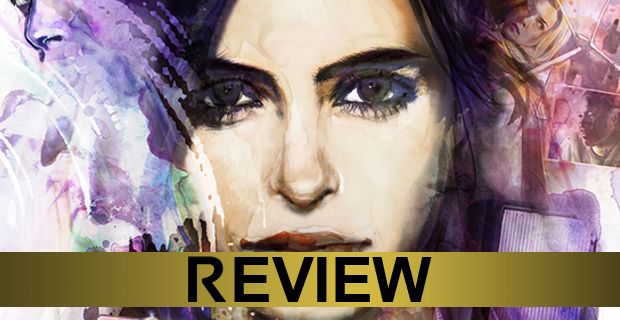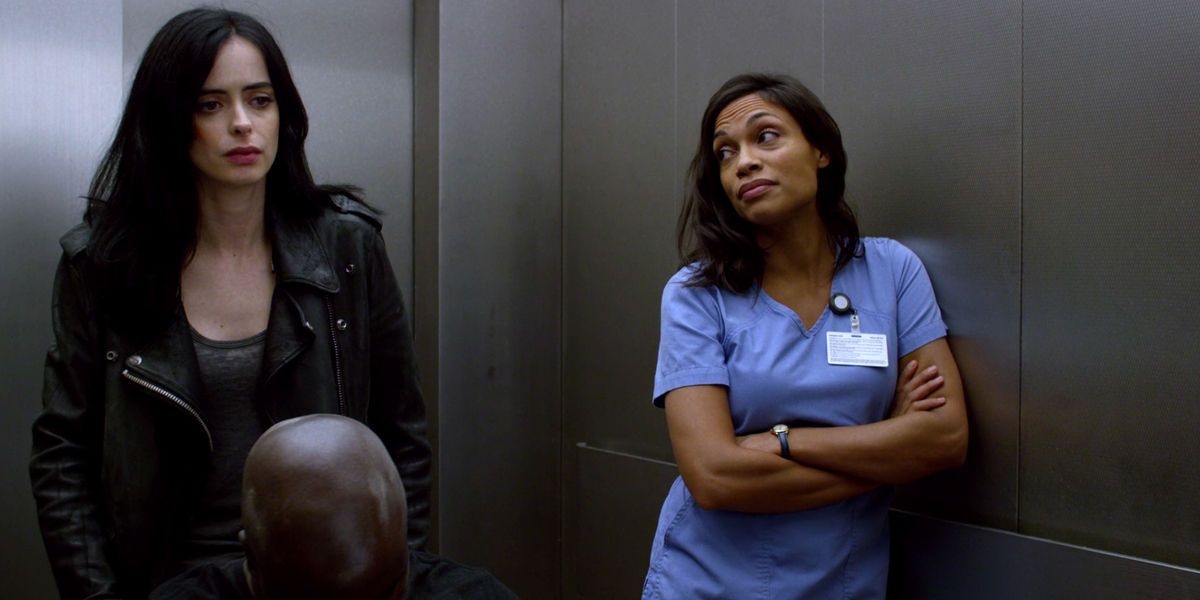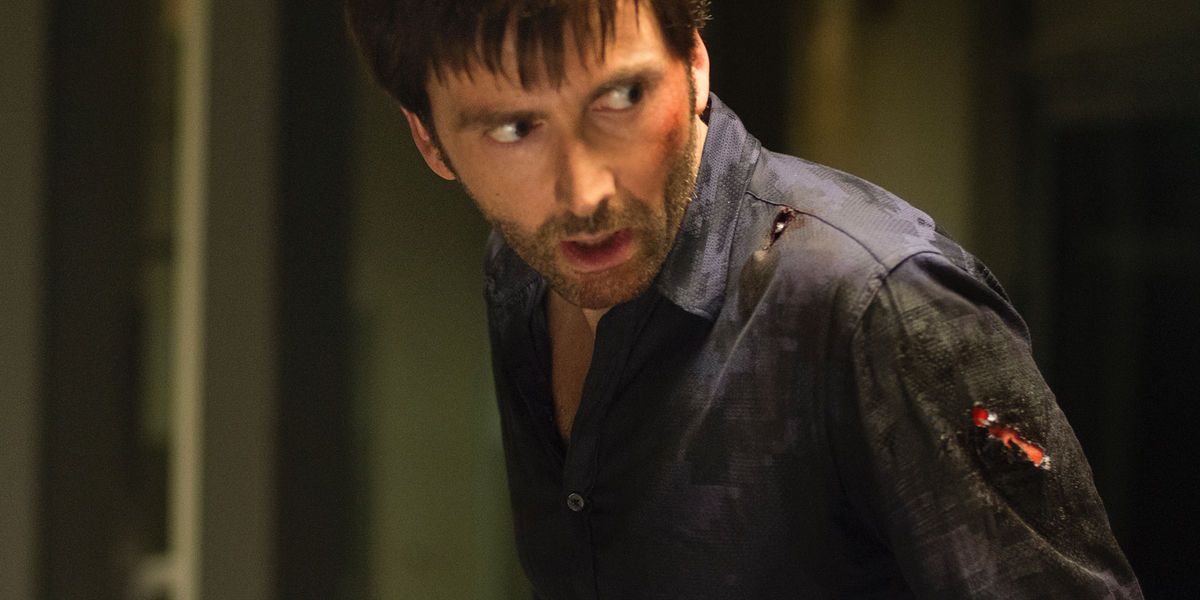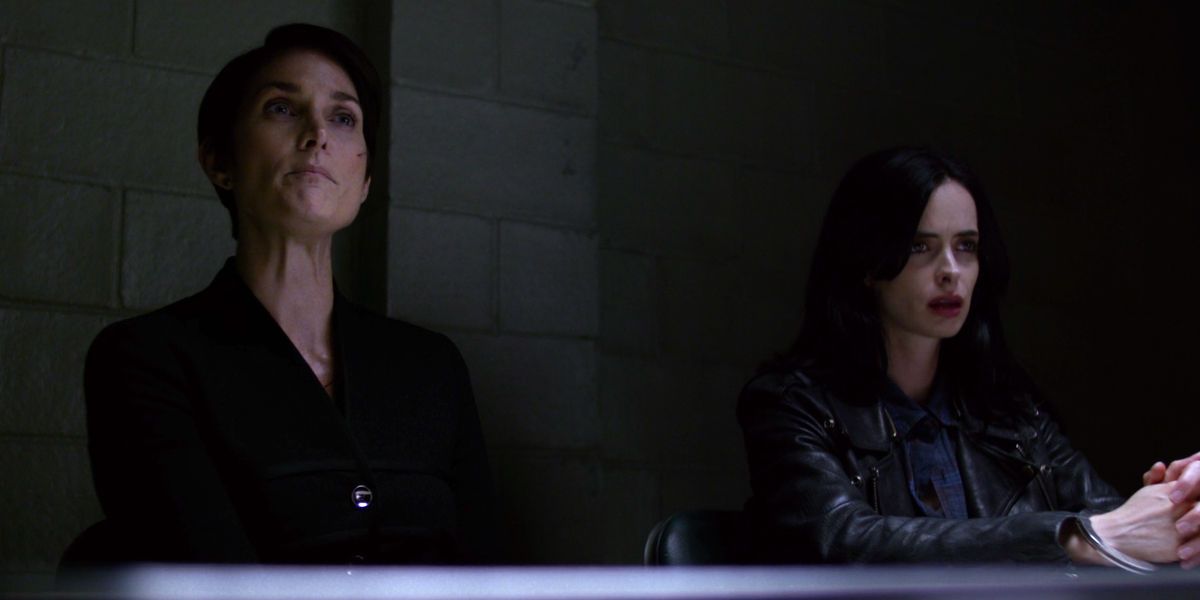[This is a review of Jessica Jones season 1, episode 13. There will be SPOILERS.]
-
One of the more enjoyable aspects of Jessica Jones throughout its very good first season was the manner in which the series seemed to naturally subvert conventions of the superhero genre, while also integrating that aspect into an already compelling storyline. The two halves of the series – its noir-ish plot of a super hard-boiled detective and the engaging feminist elements of the story – didn't exist as separate entities, but rather crafted a cohesive whole in which one complimented the other. By the time the series rolled its way to episode 13 – titled 'AKA Smile' – it was clear just how well Jessica Jones had executed both its primary plot and the ideas central to its story.
While the series worked primarily as a tale about trauma and survival, it was also about addiction and recovery, and, certainly, notions of power and control – especially pertaining to things like male privilege. This is a fundamental part of why the series' villain, Kilgrave (David Tennant), was so successful. He was menacing without engaging in some world-ending scheme. Kilgrave oozed a pernicious, odious sort of privilege, the kind a great many in the audience are more likely familiar with than, say, interstellar demigods lurking in deep space on their floating chairs or maniacal killer robots hell bent on turning an Eastern European country into the key piece of an extinction-level event. The eponymous command of "smile" near the season's end isn't just a test of Kilgrave's amped-up abilities, it's terrific reminder of what kind of villain he is and the social mindset that drives him to do what he does.
As creepy and effective a villain as Kilgrave is, and as much as the show was built around his conflict with Jessica, the series managed to be about more than just the challenge he presented. Jessica Jones was about how the titular character saw who she was, and the struggle to overcome her past trauma and the burdens that came along with it. What's interesting, then, is how, in the final moments, even Jessica – or, maybe, especially Jessica – is uncomfortable with the label being placed on her, perhaps because it suggests entry into the next uncertain chapter in her life, but more likely because she feels undeserving of such a moniker.
Earlier in the episode, Jessica says to Jeryn, "Doing something good, it helps with the self-loathing." Though one could come up with a few of examples, being motivated by an urge to quell a sense of self-loathing is not typically a defining characteristic of a superhero. But it works in Jessica Jones because the character specifically doesn’t see herself as one. At the episode's end, as Jessica is barraged with phone calls from desperate would-be clients, the voiceover that is a requirement of the show's other genre has Jessica telling the audience, "Maybe it's enough that the world thinks I'm a hero. Maybe if I work long and hard, maybe I can fool myself."
That line is a heck of a way to end the season, but it cuts to a fundamental truth about the character, one that makes Jessica Jones so compelling and unique within the realm of superhero film and television. It's not the self-doubt or self-loathing that makes Jessica such a distinctive presence amongst the costumed heroes inhabiting nearly every corner of popular entertainment these days; it's the way the character sees herself, sees through the typical assumed identity of the hero and fashions meaning from it, from its specific falseness. Jessica's new goal is to "fool" herself into thinking she can be a "hero" rather than the more typical way a hero attempts to fool others he or she is not a hero, in an effort to maintain their secret identity.
Jessica Jones is fascinating in a number of ways, but this might be the most fascinating way in which it subverts the superhero genre: By turning the idea of the hero's alter ego upside down and making it not a construct of her own doing, but rather a construct of the world she's helping, in order to help herself heal from past trauma. By the end of 'AKA Smile,' Jessica has completed what would normally pass for the archetypal hero's journey, she has slain the villain, found love (both with Luke Cage and her adoptive sister, Trish), and achieved a new level of success hinted at in the closing moments. And yet, a large part of Jessica still thinks she doesn't deserve to be called a "hero," a large part of her is going to have to hope that the world thinking of her that way will eventually be enough that she can trick herself into believing it's true.
One of the ways this inability or reluctance to identify as the hero is so interesting is that Jessica tried the costumed vigilante thing and it didn't work out so well. Even so, time and again, she has found herself gravitating toward that role. Jessica isn't above doing the hero thing in a costume, either, as her saving the life of a young girl while dressed as a sandwich suggests – though it also hits on another distinctive aspect of subversive "superhero" stories like Jessica Jones. For Jessica, her status as a "hero" carries almost zero demarcation from her status as an individual. Jessica Jones is her name, but it is also the name by which her "superheroic" exploits are known. The same goes for Luke Cage.
In a sense, because Jessica Jones is who she is and is the "hero" who stopped Kilgrave, the burden of being a hero is ostensibly doubled. There is no costumed alter ego upon which Jessica can thrust the responsibility of people in need and, notably, the life she took in an effort to be the "hero." As such, Jessica Jones leaves the question of hero status – super or otherwise – open in the final installment of its first season. Like its character, the show is operating in a murky gray area, where the idea of one person being defined as a hero largely depends on who is being asked the question.
'AKA Smile' has a great many things going on during the hour, like Jessica saving Luke's life with the help of Rosario Dawson's Claire Temple, and Kilgrave augmenting his powers and leaving behind yet another brutal crime scene. But through it all, up to and including Jessica's tense showdown with Kilgrave that ends with her decision to kill him, Jessica Jones doesn't waver in its focus on the hero at the center of this hero's journey. Although she spells it out in voiceover, it's not really necessary. Jessica's weary face as the camera pulls back down the dimly lit hallway leading up to the shattered entrance of Alias Investigations tells us everything we need to know. The hero thing is still plaguing her mind; she feels like her past and maybe even her present have betrayed some notion of what constitutes a hero.
For Jessica, her alias is not an assumed identity but the identity thrust upon her by the assumptions of others. Having been a victim whose story few people believed, it is an oddly familiar place for the character, but with one intriguing difference: Jessica is now in a place where she can define herself and set her own agenda by proving the most recent assumption right.
-
Jessica Jones season 1 is available in its entirety on Netflix.
Photos: Myles Aronowitz/Neftlix




